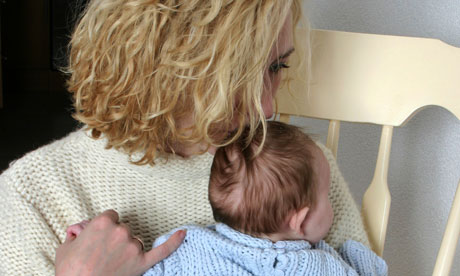
Like Apgar scores and the heel-prick test, the Edinburgh postnatal depression scale questionnaire is a moment of dark intimation in early parenthood; a point when – if your complacency has not already been shattered – you realise that the birth of a baby does not guarantee a joyful onward journey. As the health visitor guides you through it, the answers can catch in your throat. Do you feel scared or panicky? Are things getting on top of you? Have you been so unhappy that you've been crying? Amid the turbulence and exhaustion of the postpartum period, a woman's hold on what can confidently be described as "normal" can fall away.
A new report by 4Children claims that up to 35,000 mothers each year face postnatal depression (PND) without diagnosis or treatment. The survey is based on the experiences of women, many of whom, in retrospect, believe that they experienced PND but were not diagnosed. The Nice recommendations for mild to moderate PND prioritise guided self-help and home-based "listening visits", but the 4Children survey suggests that GPs are more likely to prescribe antidepressants; of the women who saw health professionals, 70% were prescribed antidepressants while 41% were given access to talking therapies. Given the paucity of data (4Children asserts that neither primary care trusts nor the Department of Health has much reliable information about how many women are diagnosed each year), it's difficult to say whether an increasing proportion of more severe cases accounts for these figures. What we do know, according to the Royal College of Psychiatrists, is that between 10% and 15% of new mothers (and around 10% of men) experience PND.
Interestingly, the figures seem to show that mothers who already have an older child are more likely to seek help. Perhaps these women are better able to distinguish postnatal depression from "normal" post-birth turmoil, or perhaps, having experienced one bout of untreated PND, they are unwilling to go through it again. Of the women who believe that they did have PND but did not seek help, nearly one-third cited anxiety over what would happen to them or their children. This almost unnameable fear – that your children might be taken away – provides one explanation for the relief expressed by women who find online sources of support. Questions that they are reluctant to ask in "real life" come tumbling out: I'm furious with my six-month-old – is that OK? I feel lazy and anxious – could that be PND? I feel as though my children would be better off without me – is that normal?
As women share their experiences, the reader can feel the choking isolation and disorientation begin to lift, however slightly. As with other aspects of pregnancy and child-rearing, the atrophy of extended family networks seems to have an exaggerated impact on women with perinatal anxiety and depression; Nice (which recommends further research into the efficacy of peer-to-peer support for PND) cites social isolation as a known risk factor.
To spend time on sites like Mumsnet, Netmums and Bounty is to see, repeatedly, how many women feel that their experiences of pregnancy, miscarriage, birth and postnatal care within the NHS fall short. The devolution of responsibility within NHS structures means that it's increasingly difficult to enforce standards of care, even where they are backed up by overwhelming data. While there are shining examples of best practice, there are also too many staff with inadequate time, training or access to resources.
New parenthood can be exhilarating, but it can also be a time of great vulnerability; the failure to provide empathetic and professionally competent support at this stage reverberates through thousands of families. Bridget O'Connell from Mind, commenting on the 4Children report, says "women need to be reassured that services are there to support them"; one way to provide such reassurance would be to methodically address the gaps between published guidance and women's lived experiences.

